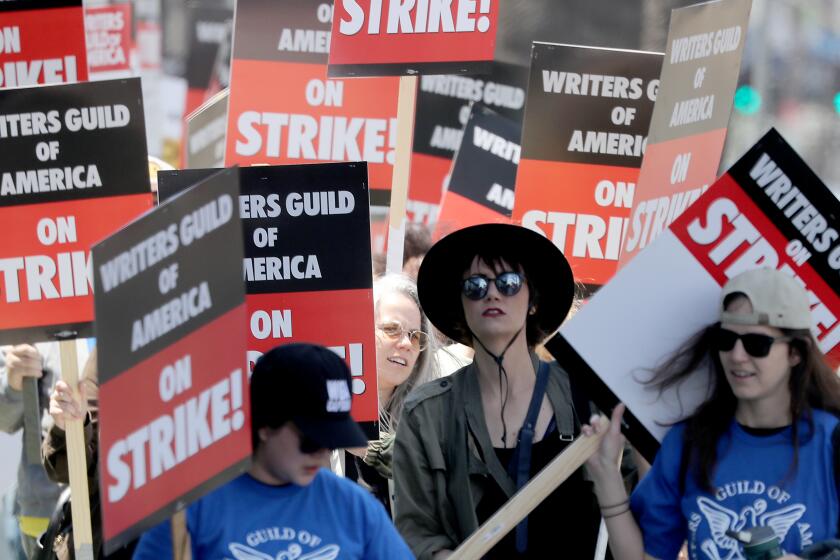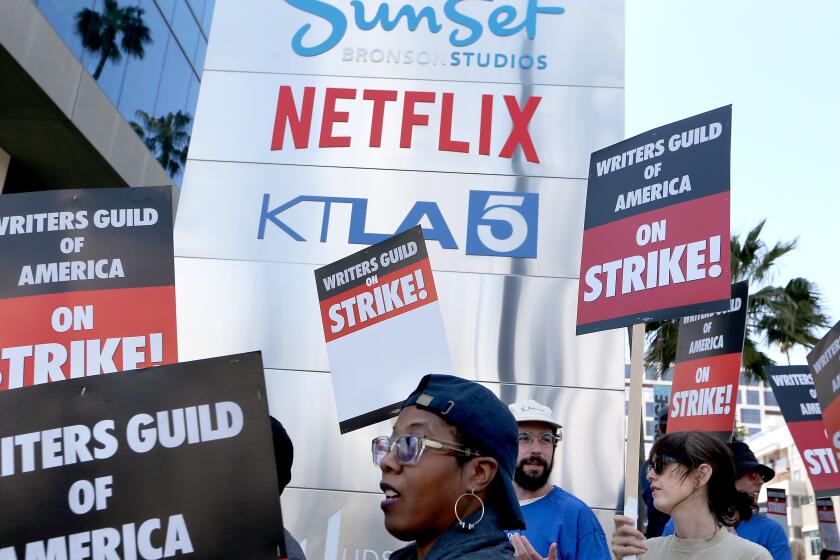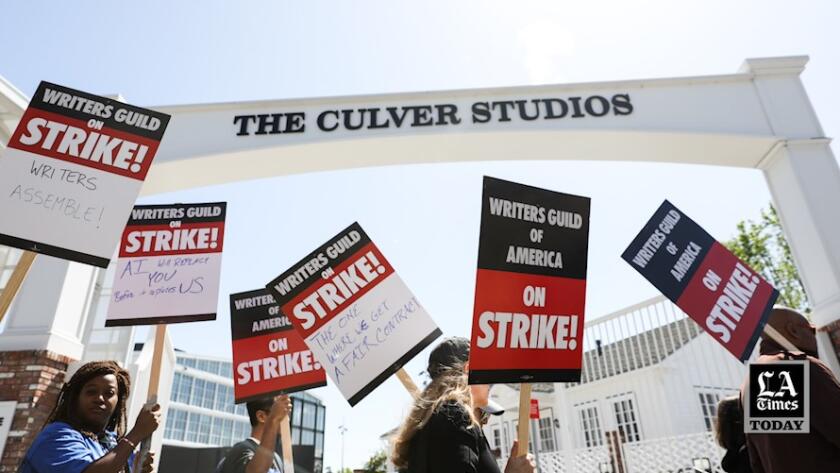
Many of the concerns motivating the current Writers Guild of America strike — from streaming residuals to the looming threat of AI displacement — are distinctly 2023 problems.
But, speaking from a picket line outside Fox Studios in Century City, Mike Royce framed the WGA’s campaign in terms of a more timeless struggle: Workers make too little, and bosses too much.
“If they don’t have any money to give us raises, then how did they — the executives in the C-suite — amass such record salaries?” asked Royce, co-creator of TNT’s “Men of a Certain Age” and the co-showrunner behind Netflix’s “One Day at a Time” reboot. “The difference between CEO pay and worker pay has never been greater in most industries, but in this industry it’s even worse.”

Subscribers get exclusive access to this story
We’re offering L.A. Times subscribers special access to our best journalism. Thank you for your support.
Explore more Subscriber Exclusive content.
It’s a recurring theme on picket lines across Los Angeles and New York: Writers say they’ve been shortchanged by the streaming revolution even as their employers were richly rewarded. “We Just want 2% from the 1%,” read one recent picket sign that reflected the Occupy Wall Street-esque rhetoric used by the WGA.
A Times review of executive compensation at 10 publicly held media and entertainment companies supports that narrative, with some qualification.
The 2023 writers’ strike is over after the Writers Guild of America and the Alliance of Motion Picture and Television Producers reached a deal.
Pay for Hollywood’s top executives soared during the height of the pandemic, climbing to $1.43 billion in 2021, up 50% from total pay in 2018, according to a Times analysis of data compiled by the research firm Equilar Inc.
Total executive compensation levels, however, dropped sharply last year as these companies faced stock market jitters and investor pressure to make streaming profitable, according to data compiled from proxy statements filed with the U.S. Securities and Exchange Commission. The compensation data includes stock options, base salaries, bonuses and other perks.
The 2021 pay surge came at a time when entertainment giants were making massive content investments in a bid to woo new users and compete with Netflix. They also bulked up through mega-mergers, creating such behemoths as Warner Bros. Discovery.
But now those same companies are grappling with high debt loads and questions about the viability of the streaming model that Netflix pioneered, which have contributed to industrywide layoffs. Walt Disney Co. and Warner Bros. Discovery both cut thousands of jobs; Netflix, Comcast’s NBCUniversal, Paramount Global and Roku also have slashed payrolls.
“The primary pressure on executive pay in Hollywood is driven by the decline in growth, particularly in streaming, seen in the aftermath of the pandemic,” said Kevin Klowden, chief global strategist at the Milken Institute in Santa Monica.
The Burbank entertainment giant in February projected that its job cuts would total 7,000 by the beginning of summer.
Still, Hollywood’s top brass are handsomely compensated by any reasonable standard.
“They don’t call it Tinseltown for nothing — but the tinsel in this case is platinum,” said Lloyd Greif, chief executive of Los Angeles investment bank Greif & Co. “They’re well-heeled. The writers are right to be turning the Hollywood spotlight onto the compensation of the people at the top of the ladder because certainly the folks farther down aren’t sharing in the spoils.”

The Alliance of Motion Picture and Television Producers, which represents the studios in labor negotiations, declined to comment.
But a studio executive with knowledge of the negotiations said: “As the Writers Guild well knows, compensation of media company CEOs — and that of nearly all CEOs, is determined by market forces, in the same way that compensation for the guild’s top-market writers and showrunners is determined.”
The Times examined executive compensation packages at Comcast, Warner Bros. Discovery, Netflix, Lionsgate, Paramount, AMC Networks, Fox Corp., Walt Disney and Roku, along with Endeavor, the Beverly Hills entertainment company that owns talent agency WME as well as live events-related businesses.
Subscriber Exclusive Alert
If you're an L.A. Times subscriber, you can sign up to get alerts about early or entirely exclusive content.
You may occasionally receive promotional content from the Los Angeles Times.
Among the most lavishly compensated executives in the industry are David Zaslav, chief executive of Warner Bros. Discovery; Endeavor CEO Ari Emanuel; Netflix co-CEO Ted Sarandos and former co-CEO Reed Hastings, who stepped down in January but remains the company’s executive chairman; and Bob Iger, the recently returned leader of Disney.
Zaslav in particular has emerged as a symbol of excessive Hollywood paychecks. The mogul recently was greeted with boos and jeers while delivering a commencement address at Boston University as some chanted “pay your writers.”
The Times’ analysis showed Zaslav’s compensation was valued at nearly half a billion dollars over the five-year span between 2018 and 2022 — the most of any major entertainment executive reviewed.
Proxy advisory firm Institutional Shareholder Services last year recommended investors “withhold” votes for three Discovery directors, citing “poor stewardship” in compensation. This year, after Warner Bros. Discovery was formed, ISS supported the directors up for election but said Zaslav’s “annual bonus and target bonus opportunity remain outsized.”
Zaslav’s compensation package in 2021 was worth nearly $247 million, mostly from stock options he received under a new employment agreement related to the WarnerMedia and Discovery merger.
To be sure, Zaslav hasn’t realized that amount because of Warner Bros. Discovery’s lagging stock price.
“A large majority of compensation actually lies in equity, whether that’s stock options or restricted stock, [and] is tied to value that executives won’t receive until later on, when the equity actually vests, and sometimes it is tied to the company’s performance,” said Courtney Yu, director of research at Equilar. “So if the company doesn’t do well, then the executive doesn’t see that equity in the future.”
A spokesperson for Warner Bros. Discovery declined to comment.
In a regulatory filing, the company said Zaslav’s contract was tied to stock option grants that “require sustained increases in share price through the term of the agreement to provide value.”
Why many members of the Writers Guild of America have targeted streaming giant Netflix in their fight for higher streaming residuals.
Netflix also has drawn scrutiny over its compensation levels — and not just by participants in what’s now being called the “Netflix strike.”
The value of Sarandos’ pay increased 32% last year to $50.3 million — including $20 million in salary and $28.5 million in option awards — despite significant cuts to programming and hundreds of layoffs that year. During the same period, Netflix’s share price dropped by half.
Hastings ranked third ($210 million) and Sarandos fifth ($192 million) among Hollywood executives in the last five years.
Notably, Netflix was also one of the two companies surveyed that had a generally upward trend in executive compensation across the five years considered — including in 2022, a tough year for the industry. San Jose-based Roku, another streaming firm, was the other such company.
“Do we think Ted Sarandos would be making that much money without the hard work of all the writers that are working on the shows that go on Netflix? Absolutely not,” said Evan Shapiro, a former NBCUniversal executive who now runs his own company.
Netflix shareholders regularly participate in an advisory vote on whether they approve of its executives’ pay. In the U.S., these votes are nonbinding; however, in other countries, losing votes can have major implications, such as triggering a snap election of the company’s board.
Typically, most companies win above a 90% approval for their executive compensation practices. But last year, Netflix received just 27% approval of its executive compensation practices from shareholders — one of the lowest approval ratings in 2022, according to Farient Advisors, an executive compensation and corporate governance consulting firm.
ISS, the proxy advisory firm for investors, slammed Netflix’s board for failing to adequately respond to shareholder concerns about its executive pay practices. “Repeated failures to address perennial concerns about executive pay indicates poor stewardship of the compensation program,” ISS said in a 2022 report.
To allay critics, Netflix reached out to shareholders last year and this year and set up a performance-based cash bonus system for its co-chief executive officers and capped base salaries of its co-CEOs at $3 million, among other changes.
“The Compensation Committee sought to maintain some personal choice — which it continues to believe is a differentiating feature that is core to our talent attraction and retention strategy — while also being responsive to shareholder concerns,” Netflix said in its regulatory filing.
Proxy advisory firm Glass Lewis called the efforts a “meaningful improvement” but said the company’s program remains “markedly deficient relative to market norms, particularly with regard to the structure of equity awards.”
ISS said there were “positive pay program changes” but recommended voting against the executive compensation proposal at the next shareholder meeting on June 1, saying, “the overall pay program continues to lack a clear and strong linkage to long-term goals” and that “overall pay magnitude is relatively high and remains a concern.”
In a non-binding vote Thursday, Netflix shareholders followed the ISS recommendation and rejected the proposed pay plan for Sarandos and other executives.
Netflix declined to comment, but in a regulatory filing the company said Sarandos’ pay increase was tied to his promotion to co-CEO and reflected market demand for his skills. His 2022 pay was also set in late 2021, before the streamer’s stock price dropped.
In Equilar’s 2022 roundup of the highest-paid CEOs, seven Hollywood figures — Emanuel, Zaslav, Sarandos and Hastings as well as Comcast’s Brian Roberts, Fox’s Lachlan Murdoch and former Disney CEO Bob Chapek — cracked the top 100.
Also placing were the CEOs of Amazon and Apple, tech giants that own Amazon Studios and Apple TV+; the cable company Altice USA; Charter Communications, which jointly runs with Comcast the Roku competitor Xumo; and SiriusXM Holdings.
Emanuel was the second-highest-compensated entertainment executive in The Times’ analysis, with his package valued at nearly $350 million over five years, largely reflecting stock awards he received from the company’s IPO in 2021. He may never receive the full value of the awards.
Endeavor declined to comment.
Endeavor, which is not a member of the producers’ alliance, sold most of its production company as part of an agreement with the WGA. Emanuel also has expressed support for the agency’s writer clients, recently telling investors “there’s real issues that have to be addressed.”
Even in a country racked by economic inequality, Hollywood’s pay scales are unique. Of the top 30 highest-paid CEOs in the U.S., 27% come from the media and entertainment space, even though that sector accounts for only about 7% of gross domestic product, Greif said.
“There’s no rhyme or reason to it, other than I think being tone-deaf in the boardrooms and the executive suites of Hollywood,” he said. “If nothing else comes out of the writers’ strike, having this focus on that gross disparity in pay, I think, is going to be productive.”
James Reda, an expert in executive compensation, said Hollywood executives get paid a premium of about 30% over their equivalents in other industries. He attributed that bump to the higher stakes associated with a job that can involve managing fraught IP battles, box office bombs and difficult showbiz personalities.
Other experts suggested additional explanations, including high pay for celebrities.
“When they’re paying Chris Pratt 20 million bucks for ‘Guardians of the Galaxy,’ it just doesn’t sound that outrageous to pay Bob Iger $20 million,” said Michael Pachter, managing director for equity research at Wedbush Securities.
(Iger was the fourth-highest-paid entertainment executive, making $195 million from 2018 to 2022, even though he left the company for most of last year. Disney board members said in a regulatory filing his compensation is “appropriately aligned with shareholder value creation.”)
Charles Elson, founding director of the Weinberg Center for Corporate Governance, said other factors have contributed to large Hollywood paychecks: the practice of “peer grouping” pay (or basing an executive’s compensation on what their industry peers make); and the popularity of dual-class stock structures (a corporate mechanism that can afford CEOs more power to raise their own pay). The result, Elson said, is that some media executives give themselves higher-than-average pay packages, and then their peers use that to justify making more too.
“The mechanisms on which these comp packages operate will always accelerate pay in a way that’s probably disconnected from the actual performance of the company,” Elson said.
The issue has certainly aggravated tensions with striking writers, who see evidence of a widening income divide.
In The Times’ analysis of Equilar data, average pay for top Hollywood executives rose 53% to $28 million between 2018 and 2021. During the same period, average compensation for writers remained virtually flat and totaled $260,007 in 2021, according to WGA data. Further down on the pay scale, camera operators in California saw their average pay increase 7% to $81,868 over the three years, according to data from the state Employment Development Department.
The WGA does not release median pay data for its members — who include show creators such as Ryan Murphy and Shonda Rhimes with multimillion-dollar deals. (These unusually high earners can skew the average pay number upward, which is also true for average pay calculations among executives.)
The union has argued that pay for most working writers has been steadily eroded during the streaming era. For example, the WGA says half of all TV series writers were paid the basic minimum rate under the union’s contract, up from 33% in 2013-14.
Questions about how much entertainment industry executives earn aren’t new. A 2010 Times review of C-suite pay packages found that even as CEOs in other industries saw their compensation drop, those in film and TV raked in impressive packages on par with what some A-list celebs earned. Disney has long been the target of complaints over CEO pay compared with the wages of its theme park workers. In 2018, 52% of shareholders voted against the company’s compensation plan for Iger and other executives.
But for Kaitlin Fontana, a film and TV writer who sits on the WGA East council, seeing how much Hollywood executives get paid is, right now, particularly galling.
“If they gave us everything that we asked for, it would make a difference of 2% in the bottom line that the studios currently are paying,” Fontana said as she headed to a picket line outside of Walt Disney Studios on the first day of the strike. “That’s a rounding error for a lot of these guys.”
Times staff writers Meg James and Anousha Sakoui contributed to this report.
Watch L.A. Times Today at 7 p.m. on Spectrum News 1 on Channel 1 or live stream on the Spectrum News App. Palos Verdes Peninsula and Orange County viewers can watch on Cox Systems on channel 99.
More to Read
Subscriber Exclusive Alert
If you're an L.A. Times subscriber, you can sign up to get alerts about early or entirely exclusive content.
You may occasionally receive promotional content from the Los Angeles Times.













